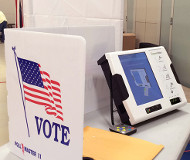11/10/2016
Voters Reject Transportation Taxes And ProjectsVoters around the country largely reject transportation tax hikes and transit projects during presidential election contest.

Transportation was never a hot topic during this year's presidential debates, but the issue has earned a place at the top of the agenda for the incoming administration. Early on Wednesday morning, Donald J. Trump mentioned road spending in his list of priorities.
"We are going to fix our inner cities and rebuild our highways, bridges, tunnels, airports, schools, hospitals," the Republican president-elect said. "We're going to rebuild our infrastructure, which will become, by the way, second to none. And we will put millions of our people to work as we rebuild it."
Much further down the ticket, voters in a number of jurisdictions were asked to set the direction for local transportation spending with their vote. Washington state's Initiative 732, which would have imposed a "carbon tax" system, proved to be the night's biggest loser. The measure would have added another 25 cents to the gasoline tax, which had only recently seen a 12 cents per gallon increase. Opponents of the idea argued that the cash raised by the complex scheme would do nothing for the motorists paying the tax.
"Unlike the gas tax, the carbon tax gas price increase does not put any money back into relieving our congested highways and bridges or provide new transit options," the No On 732 Campaign explained.
At the end of the day, 59 percent of the state's voters said 'no' to the plan. Illinois voters, with a much stronger 78 percent majority, insisted that money raised from motorists be used solely for "transportation" purposes, rather than for shoring up the general fund. New Jersey adopted a similar measure by a narrower 54 percent margin.
At the local level, gas tax hikes proved unpopular. In Oregon, voters in Clackamas County, Coburg, Coos Bay, Cornelius, Cottage Grove, King City, North Bend, Springfield and Tigard said 'no' to gas tax increases of between 3 and 6 cents. In Nevada, voters in Carson City, Lyon and Douglas counties rejected a 3-cent hike.
Voters also expressed disapproval of other taxes being used to fund transit projects. In San Diego, California, voters killed Measure A, which would have hiked the sales tax by 0.5 percent to spend on "bus, train and trolley" services and bicycle lanes. A similar tax in San Luis Obisbo County and Ventura County likewise failed to achieve the two-thirds vote required to impose a tax increase. Peoria County, Illinois rejected a sales tax hike that was specifically dedicated to actual road improvements. Virginia Beach, Virginia rejected a light rail project with 57 percent of the vote.
Tuesday night's message was far from unanimous, however, as a some jurisdictions did endorse transit plans and tax increases. Stanislaus County, California was one of the few jurisdictions able to overcome the two-thirds barrier to raising taxes for transit. Wake County, North Carolina secured 53 percent of the vote to boost the sales tax for bus and rail services. Spokane, Washington likewise increased the sales tax for more spending on buses. Charleston County, South Carolina will pay more in sales taxes to raise $600 million for buses, $200 million on "green spaces" and the remainder on a handful of road projects.


